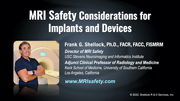A complete listing of currently available online programs is provided below. To view course materials click an available viewing format provided with each listing (PDF, HTML, Interactive). To access online exams and claim credit you must be registered and logged in. To add courses to your "MyAR Archives" user account select the "Add To Cart" button provided with each course title and follow the prompts.
|
* From Head to Toe: Practical MRI Applications of Gadopiclenol in Everyday Practice
|
|
Released:
December 10, 2025
•Expires:
December 31, 2028
|
CE credits:
1.0
• Cost:
$0.00
|
|
Faculty:
Thorsten Bley
|

Join us for this CME-accredited webinar to explore the clinical performance of gadopiclenol, a new-generation MRI contrast agent. The session begins with an overview of gadopiclenol’s unique chemical properties and a review of current scientific evidence supporting its safety, efficacy, and diagnostic reliability.
Professor Thorsten Bley from the University Medical Center Würzburg in Germany will then share real-world experience and case-based examples from head to toe, highlighting image quality, workflow considerations, and comparisons with other contrast agents. The program concludes with a discussion of the environmental benefits of using half the gadolinium dose while maintaining high signal intensity.
Expand your MRI knowledge and discover how gadopiclenol can enhance diagnostic confidence—register today to participate in this evidence-based, case-driven learning experience
Educational Objectives:
At the completion of this activity, participants should be able to:
-
Incorporate current evidence on the design, safety, and efficacy of gadopiclenol to guide informed MRI contrast agent selection.
-
Implement optimized MRI protocols that achieve equivalent or greater signal intensity using half the gadolinium dose compared with conventional GBCAs.
-
Adopt environmentally responsible imaging practices by reducing gadolinium use and understanding its potential impact on wastewater and the environment.
This program is made possible through an unrestricted educational grant from Guerbet.
|
|
|
|
|
* Basic MRI Safety Training (5th Edition) | Level 1 MR Personnel
|
|
Released:
July 10, 2025
•Expires:
August 31, 2028
|
CE credits:
1.0
• Cost:
$30.00
|
|
Faculty:
Frank G. Shellock, PhD, FACC, FACR, FACSM
|

Individuals entering the magnetic resonance imaging (MRI) environment, whether on a regular or infrequent basis, must be properly trained to ensure their safety, the protection of patients, the security of facility staff members, and others. This program, Basic MRI Safety Training (5th Edition), Level 1 MR Personnel, accomplishes the training that is necessary to ensure safety in the unique setting associated with the MRI system and includes information pertaining to MRI technology, describes common hazards and unique dangers associated with the MRI setting, and presents vital guidelines to prevent accidents and injuries.
With more than 40 years of experience in the field of MRI, the author of the best-selling textbooks, the Reference Manual for Magnetic Resonance Safety, Implants and Devices (19 editions), and the creator of the internationally popular website, www.MRIsafety.com, Dr. Frank G. Shellock is uniquely qualified to present the information provoded in this program.
Educational Objectives
-
Appreciate the importance of MRI as an imaging modality
-
Identify the hazards associated with MRI
-
Understand the MRI safety screening process
-
Describe steps to prevent accidents and injuries
This is a Pay-To-View program. Purchase is required for full program access.
|
|
|
|
|
* Advanced MRI Safety Training For Healthcare Professionals (4th Edition): Level 2 MR Personnel
|
|
Released:
April 22, 2020
•Expires:
April 30, 2026
|
CE credits:
3.0
• Cost:
$50.00
|
|
Faculty:
Frank G. Shellock, PhD, FACC, FACR, FACSM
|

This program reviews fundamental MRI safety information and meets the annual training recommendations from the American College of Radiology. Importantly, MRI facilities must now comply with the revised requirements for diagnostic imaging from The Joint Commission and document that MRI technologists participate in ongoing education that includes annual training on safe MRI practices in the MRI environment. Notably, Advanced MRI Safety Training for Healthcare Professionals, Level 2 MR Personnel covers each MRI safety topic specified by The Joint Commission, as well as many additional subjects that will expand the knowledge-base of healthcare professionals involved with MRI technology.
With 35 years of experience in the field of MRI, the author of the best-selling textbook series, the Reference Manual for Magnetic Resonance Safety, Implants and Devices, and the creator of the internationally popular website, MRIsafety.com, Dr. Frank G. Shellock is uniquely qualified to present the information in this program.
Advanced MRI Safety Training for Healthcare Professionals (4th Edition), Level 2 MR Personnel is a 2 hour and 45 minute program that is divided into three different sections.
Educational Objectives
-
Understand the safety issues related to MRI.
-
Describe the bioeffects associated with the static magnetic field, time-varying magnetic fields, and radiofrequency fields.
-
Present guidelines that prevent projectile-related accidents.
-
Describe polices that avoid issues related to acoustic noise.
-
Review procedures that prevent burns associated with MRI.
-
Explain and demonstrate appropriate pre-MRI screening procedures.
-
Identify techniques to manage patients with claustrophobia, anxiety, or emotional distress.
-
Describe guidelines to handle medical emergencies in the MRI setting.
-
Understand the safety considerations for gadolinium-based contrast agents.
This is a Pay-To-View program. Purchase is required for full program access.
|
|
|
|
|
* The Online Course for MR Safety Officers (MRSO) and MR Medical Directors (MRMD)
|
|
Released:
September 29, 2022
•Expires:
September 30, 2028
|
CE credits:
10.0
• Cost:
$975.00
|
|
Faculty:
William Faulkner, B.S.,R.T.(R)(MR)(CT), FSMRT | Kristan Harrington, MBA, R.T.(R)(MR), ARRT, MRSO
|

Applied Radiology and William Faulkner & Associates are pleased to introduce “The Online Course for MR Safety Officers (MRSO) and MR Medical Directors (MRMD)”. This comprehensive program, focusing on MR Safety, covers many aspects relating to the safety practices of the Magnetic Resonance Imaging (MRI) environment. It is designed for those individuals who are either currently serving as their facility’s MRSO and/or MRMD, or those who are preparing to assume these responsibilities. The content of this course will be helpful for those preparing for the American Board of Magnetic Resonance Safety MRSO and MRMD examinations.
The content of The Online Course for MR Safety Officers and MR Medical Directors is based upon current FDA and ACR guidelines, including the ACR Guidance Document for MR Safe Practices, as well as those promulgated by industry regulatory bodies such as the International Electrotechnical Commission.
The complete online program has been approved for up to 10 AMA PRA Category 1 credits™ (CME) and 10 Category A ARRT continuing educational credits (CE).
Module 1: Basic MRI Physics Relevant to MRI Safety
Module 2: Static Field: Bioeffects and Access Control
Module 3: Gradient Magnetic Fields: Bioeffects and Safety
Module 4: Radio Frequency Field: Bioeffects and Safety
Module 5: Implants and Devices
Module 6: Gadolinium-Based MR Contrast Agents
Module 7: MR Safety Screening
Module 8: Managing Emergent Situations and Patient Considerations: Quench and Patient Anxiety & Patient Monitoring
The Online Course for MR Safety Officers (MRSO) and MR Medical Directors (MRMD) is not affiliated with, nor endorsed by the American Board of Magnetic Resonance Safety (ABMRS)
Terms and Conditions of Use: Click To View
This is a Pay-To-View program. Purchase is required for full program access.
|
|
|
|
|
Clinical Applications of MR Imaging in Stereotactic Localization Radiosurgery Procedures
|
|
Released:
January 2, 2024
•Expires:
January 31, 2027
|
CE credits:
1.5
• Cost:
$0.00
|
|
Faculty:
Jenny WU, MD | Glen Stevens, DO, PhD
|

Gadolinium-based contrast agents (GBCAs) are essential for enhancing the quality of MRI scans to make it easier for radiologists to identify pathology. The US Food and Drug Administration (FDA) and the American College of Radiology (ACR) recommend limiting patient exposure to gadolinium where possible.
One technique for reducing this exposure is to use a high relaxivity GBCA that can be administered at a lower dose than a conventional GBCA, without any impact on image quality. GBCA selection for interventional procedures such as radiosurgery is one such example, where the selection of a GBCA can play a role in patient management and outcomes.
In this program, an experienced neuroradiologist and neuro oncologist will present their clinical experiences with the use of stereotactic localization radiosurgery, following the administration of a high relaxivity GBCA. Through case study examples, the clinical impact of contrast selection will be demonstrated. Following the presentation, questions from the audience will be addressed during a live Q&A.
Educational Objectives:
At the completion of this activity, participants should be able to:
-
Review the role of stereotactic radiosurgery (SRS) for brain metastases and the role of pre-operative localization MRI exams for stereotactic radiosurgery.
-
Outline the differences between gadopiclenol and other group II gadolinium-based contrast agents.
-
Discuss the use of gadopiclenol in specific case-based scenarios for stereotactic localization exams and its impact on patient management.
This program is made possible through an unrestricted educational grant from Guerbet.
|
|
|
|
|
Gadopiclenol | Considerations for Use in Pediatric MRI
|
|
Released:
April 29, 2024
•Expires:
April 30, 2027
|
CE credits:
1.0
• Cost:
$0.00
|
|
Faculty:
Shreyas Vasanawala, MD, PhD
|

This educational program featuring Dr. Shreyas Vasanawala will cover pediatric MR imaging applications using Gadopiclenol, a recently approved gadolinium-based contrast agent (GBCAs).
Following a brief review of the literature and the currently available GBCAs, Dr. Vasanawala will discuss practice considerations as they relate to MRI contrast media selection and dose administration. Additionally, Dr. Vasanawala will share several case studies demonstrating the clinical value and benefits of Gadopiclenol for patients who may present with complex pathology and/or who may be subject to repeat contrast-enhanced MRI exams over their lifetime.
Educational Objectives:
At the completion of this activity, participants should be able to:
-
Explain the properties that distinguish gadopiclenol injection from the other high relaxivity gadolinium-based contrast agents (GBCAs).
-
Employ the FDA-approved indications and clinical applications for gadopiclenol injection in pediatric patients.
-
Apply clinical considerations and dosing options for gadopiclenol administered to vulnerable patient populations who may experience repeat, lifetime dosing of a GBCA.
This program is made possible through an unrestricted educational grant from Bracco Diagnostics Inc.
|
|
|
|
|
Gadopiclenol Injection | Considerations for Use in Breast MRI
|
|
Released:
December 9, 2024
•Expires:
December 31, 2027
|
CE credits:
1.0
• Cost:
$0.00
|
|
Faculty:
Margarita L. Zuley, MD, FACR
|

While gadolinium-based contrast agents (GBCAs) are essential to performing breast MR imaging, guidance from the US Food and Drug Administration (FDA) and the American College of Radiology (ACR) includes the recommendation of limiting a patient's gadolinium exposure. Gadopiclenol injection, a macrocyclic, high-relaxivity GBCA can address this recommendation by providing high-quality images with half the gadolinium dose as compared to other conventional GBCAs.
This educational program features Dr. Margarita Zuley’s clinical expertise and practice experience. Through case study examples she will share the indications for abbreviated breast MRI and the clinical rationale for implementing optimal imaging protocols using a lower gadolinium dose and clinical examples of the management of MRI detected findings.
Educational Objectives:
At the completion of this activity, participants should be able to:
-
Explain the clinical benefits of abbreviated breast MRI for patients with dense breast and/or high-risk factors.
-
Implement lower gadolinium dosing protocols for patients who may experience repeat breast MRI scans.
-
Understand the clinical paradigms and indications for breast MRI as it relates to other imaging modalities.
This program is made possible through an unrestricted educational grant from Bracco Diagnostics Inc.
|
|
|
|
|
Gadopiclenol Injection | Practical Considerations for Use
|
|
Released:
October 23, 2023
•Expires:
October 22, 2026
|
CE credits:
1.0
• Cost:
$0.00
|
|
Faculty:
William Faulkner, B.S.,R.T.(R)(MR)(CT), FSMRT
|

With the recent FDA approval of gadopiclenol injection, radiologists now have the choice of a macrocyclic gadolinium-based contrast agent (GBCA) with 2 – 3 times higher relaxivity at a lower standard dose as compared to other gadolinium-based contrast agents on the marke
Therefore, and because gadopiclenlol is different than other currently available GBCAs, a review of the clinical benefits of using a higher relaxivity GBCA at a lower administered dose is important. A clear understanding of relaxivity and calculation of the volume to be administered based on dosing considerations, is necessary
In this accredited webinar, Mr. Faulkner will provide insights into the differences of the current FDA-approved GBCAs and how these differences apply to MR imaging. Following the presentation, questions from the audience were addressed during a live Q&A.
Educational Objectives:
At the completion of this activity, participants should be able to:
-
Identify the properties that distinguish gadopiclenol injection from the other high relaxivity and conventional gadolinium-based contrast agents (GBCAs).
-
Employ the FDA-approved indications and clinical applications for gadopiclenol injection.
-
Calculate and administer the proper volume dose of gadopiclenol, as compared to other conventional GBCAs.
-
Apply clinical considerations and dosing options for gadopiclenol to vulnerable patient populations who may experience repeat dosing of GBCA.
Made possible through an unrestricted educational grant from Bracco Diagnostics, Inc.
|
|
|
|
|
Managing Patients with Passive Implants on Vertical Field MR Systems
|
|
Released:
August 1, 2022
•Expires:
August 16, 2026
|
CE credits:
1.0
• Cost:
$0.00
|
|
Faculty:
Lawrence N. Tanenbaum, MD, FACR | Frank G. Shellock, PhD, FACC, FACR, FACSM | William Faulkner, B.S.,R.T.(R)(MR)(CT), FSMRT
|

MRI technology has advanced with the availability of low - vertical field scanners. However, many patients present with passive implants and devices that are available in clinical practice, yet not approved for MR imaging in low field scanners.
In this CME program three MR imaging experts will provide unique perspectives on managing patients with passive implants and devices. The panel will discuss important MRI safety information and details on how to safely image these patients, including a review of screening policies, implant and device manufacturers’ information and resources, and the implementation plan for a MRI safety program, designed to mitigate the potential risks to patients presenting with passive implants and devices.
Learning Objectives
-
Identify challenges associated with imaging patients with passive implants on low field (<1.5-T) MR systems.
-
Review MRI considerations in order to safely manage patients that present with passive implants referred for scans on low field MR systems.
-
Implement protocols to safely scan patients presenting with passive implants that are not labeled for low field scanners, including 1.2-T MR systems.
-
Increase the number of patients eligible for MRI exams.
This program is made possible through an unrestricted educational grant from FUJIFILM Healthcare Americas Corporation.
|
|
|
|
|
MRI Safety Considerations for Implants and Devices
|
|
Released:
February 1, 2023
•Expires:
February 28, 2026
|
CE credits:
1.5
• Cost:
$30.00
|
|
Faculty:
Frank G. Shellock, PhD, FACC, FACR, FACSM
|

This accredited program provides a comprehensive overview of MRI safety considerations for passive / active implants, and devices.
When considering patient safety during MR imaging, it is critical to assess the patient’s history and have a clear understanding of any passive and or active implants and/or devices. The ACR Manual on MR Safety states that the Radiologist is responsible for the safety of the patient undergoing the MRI Exam. They are also responsible for implementing MR Safety policies and procedures and ensuring that the facilities’ personnel adhere to them at all time. Regarding implants and devices, regular reviews and updates to the MRI safety policy should be completed.
With more than 35 years of experience in the field of MRI, the author of the best-selling textbook series, the Reference Manual for Magnetic Resonance Safety, Implants and Devices, and the creator of the internationally popular website, www.MRIsafety.com, Dr. Frank G. Shellock is uniquely qualified to present this important MRI Safety information designed for MRI Imaging professionals.
Educational Objectives
-
Name and describe the current labeling terminology for implants & devices.
-
Safely image patients with passive and active, MR Conditional implants and devices.
-
Establish a comprehensive MRI Safety protocol for imaging implants & devices.
Program support provided by Bracco Diagnostics, Inc.
This is a Pay-To-View program. Purchase is required for full program access.
|
|
|
|
|
MRI Safety Considerations For The Radiologist
|
|
Released:
February 16, 2023
•Expires:
February 28, 2026
|
CE credits:
1.5
• Cost:
$30.00
|
|
Faculty:
William Faulkner, B.S.,R.T.(R)(MR)(CT), FSMRT | Kristan Harrington, MBA, R.T.(R)(MR), ARRT, MRSO
|

This accredited program provides a comprehensive overview of MRI safety including the radiologist's responsibilities and liabilities, MRI staff education and patient safety. It is designed specifically for practicing radiologists, fellows, residents, and healthcare professionals who oversee MRI services and will provide practical guidance from two respected MRI safety educators who present information on accepted safety standards of care based on the 2020 ACR Manual on MR Safety, the 2021 FDA Guidance Document, and a review of the literature.
Program Considerations: It is critical to have established MRI safety protocols and to have a clear understanding of the basics of MRI Safety. The ACR Manual on MR Safety states that the Radiologist is responsible for the safety of the patient undergoing the MRI Exam. They are also responsible for implementing MR Safety policies and procedures and ensuring that the facilities’ personnel adhere to them at all time. These MRI safety policies should be reviewed and updated annually in order to prevent patient injury.
Educational Objectives
-
Describe the difference between Level 1 & Level 2 MR personnel.
-
Differentiate and identify the ACR-designated Safety Zones.
-
Implement safety considerations for the static magnetic field, time-varying gradient magnetic fields, and radiofrequency fields.
-
Employ procedures and protocols to prevent RF-related burns and methods to manage SAR levels.
-
Manage acute and chronic gadolinium-based contrast agent adverse events.
Program support provided by Bracco Diagnostics, Inc.
This is a Pay-To-View program. Purchase is required for full program access.
|
|
|
|